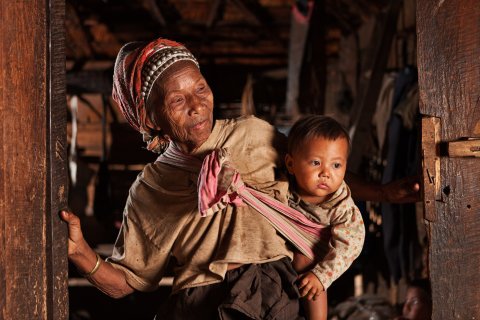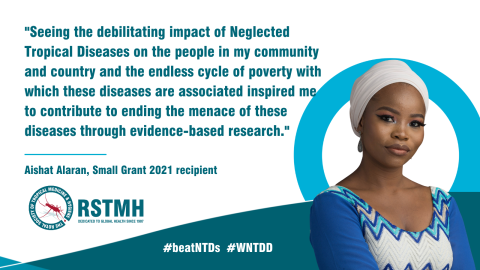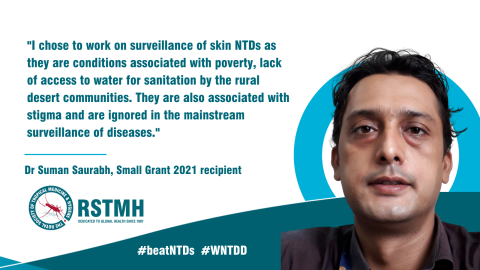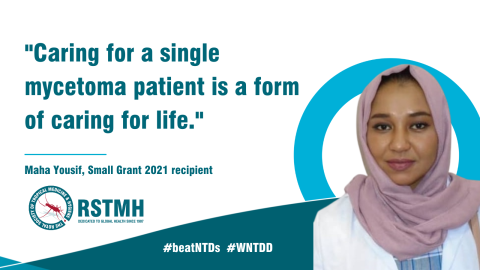World NTD Day 2022

This Sunday is World NTD Day. A global movement to end Neglected Tropical Diseases (NTDs), now in its third year, which RSTMH is proud to partner.
More than one in five people worldwide are affected by NTDs, resulting in over 1.7 billion people facing ill health and stigma, disability and even death. The group of 20 conditions are widespread in the world’s poorest regions, where water safety, sanitation and access to health care are not good enough.
Caused mostly by a variety of pathogens including viruses, bacteria, parasites, fungi, and toxins, diseases are “neglected” because they are almost absent from the global health agenda, enjoy little funding, and are associated with stigma and social exclusion.
We, at RSTMH, have long been aware of the devastating impact of NTDs on communities around the world, with NTDs forming one of our key thematic priorities. We support efforts to beat these diseases through our communications and policy activities, our grants programme, journals and through the work of our members.
Within NTDs we focus on the most neglected diseases in terms of awareness, research or funding, and also on the challenging contexts which often stop progress or elimination. These include challenges of poverty, lack of water and sanitation, conflict, and other elements of the sustainable development goals.
Over the last ten years the efforts to tackle NTDs have also been a global health success story, with 600 million people no longer requiring treatment. But there is still a lot more work to be done before the world is free of these diseases.
During this week, which ends with World NTD Day, we are supporting the work of many partners and programmes including the Wealth Health Organization (WHO) as they address the inequalities that characterise NTDs. On Wednesday they held an online event to celebrate World NTD Day. During this, Tedros Adhanom Ghebreyesus, Director-General of the World Health Organization, called on the global community to continue their work to break the cycle of poverty and provide equitable health services to help beat NTDs.
The WHO are also hosting a second online event this afternoon, bringing together member states, UN entities and partners across sectors for an interactive discussion on national experiences, best practices and lessons learned in combatting NTDs.
Last year the WHO launched its NTD 2021–2030 road map, in which its goals include the reduction of the number of people requiring intervention against NTDs by 90%; for 100 countries to have eliminated at least one NTD; and, to completely eradicate two NTDs. They aim to achieve these goals through strengthening the response to NTDs by focusing on cross-cutting issues and disease specific targets.
To mark the launch of the road map, in partnership with the WHO, as well as NTD pioneers such as Dr Wendy Harrison and Professors Ahmed Fahal, Diana Lockwood and Alan Fenwick, we commissioned a series of blogs focusing on NTDs such as rabies, schistosomiasis, snakebite, leprosy, mycetoma, guinea worm and onchocerciasis.
The series, “Ending NTDs: Together towards 2030”, not only demonstrates the successes and progress made so far, but also what needs to happen to reach the road map's targets of elimination and eradication.
Kigali Declaration
This World NTD Day also marks ten years since the London Declaration on Neglected Tropical Diseases, a groundbreaking partnership of Individuals, foundations, NGOs and pharmaceutical companies who came together to make commitments of treatments, funding, research and more to eliminate and control NTDs.
Since 2012, over a billion people have had preventive treatment each year, for four consecutive years, for at least one NTD, and 32 countries have eliminated at least one of them.
We support Uniting to Combat NTDs as they work to launch the Kigali Declaration, which we will be committing to, and as they launch the 100% Committed campaign to ending NTDs.
We join the call on our governments, pharmaceutical companies, donors, research institutions and NGOs to show they will help #BeatNTDs by signing the Kigali Declaration.
We joined them at the online launch this Thursday where high-level guests included: H.E. Dr. Edouard Ngirente, Prime Minister of the Republic of Rwanda; H.E. Muhammadu Buhari GCFR, President of the Federal Republic of Nigeria; H.E. Samia Suluhu Hassan, President United Republic of Tanzania; H.E. James Marape, Prime Minister Papua New Guinea; Hon. Shinzo Abe, Former Prime Minister Japan; Rt Hon Amanda Milling MP, Minister of State, Foreign Commonwealth and Development Office (FCDO), United Kingdom; and, Prof. Sir Chris Whitty, Chief Medical Officer, England .
During the event they launched the 100% Committed campaign to ending NTDs, as well as kicked off endorsements and commitments for the Kigali Declaration.
Journals
Through our two journals, Transactions of the Royal Society of Tropical Medicine & Hygiene and International Health, we have been supporting the mission to beat NTDs. We have pulled together a collection of our recent journal articles on NTDS, free to access, to mark World NTD Day.
In the last two years we have also published four Special Issues on NTDs in Transactions of the Royal Society of Tropical Medicine & Hygiene:
- Special Issue: Mycetoma
- Special Issue: Modelling the Potential Impact of Covid-19 Related Programme Interruptions on Seven Neglected Tropical Diseases
- Special Issue: Special Issue: Neglected Tropical Diseases: Planning for the Next Decade of Progress
- Special Issue: Podoconiosis - Cross-Disciplinary Research Updates in the Year of NTDs
International Health also published a supplement on Lymphatic Filiariasis, with contributions from many working internationally within the NTD community.
Grant recipients

Our grants are a great way to both encourage much needed research into all aspects of NTDs, and also empower the next generation of researchers to undertake their first projects.
Since 2019 when the Small Grants Programme really started to increase the number of awards made, we have seen a range of projects on the topic of NTDs. We’ve spoken to a group of these recipients, to ask them why they chose their areas of focus. We are sharing these stories on our Twitter account, or see a selection below.
‘Why have you chosen to focus your research on Neglected Tropical Diseases in Africa?’

‘Why have you chosen to focus your research on the surveillance of skin NTDs in western Rajasthan, India?’

'Why have you chosen to focus your research on mycetoma treatment in Sudan?'
World Leprosy Day
As well as World NTD Day, Sunday is also World Leprosy Day. Leprosy, also known as Hansen’s Disease, is one of the NTDs, caused by infection with a slow-growing bacterium, mainly affecting the skin, peripheral nerves and eyes.
Accounts of the disease can be found throughout history and people affected have often been, and still face stigmatization from their communities.
World Leprosy Day is an opportunity to celebrate the achievements and progress of the disease, the experiences of patients who have experienced leprosy, and to raise awareness of the disease, and call for an end to leprosy-related stigma and discrimination.
The year’s campaign centres around being “United for Dignity”, calling for unity in honouring the dignity of people who have experienced leprosy. We support the campaign as we honour the lived experiences of individuals who have experienced leprosy by advocating for mental wellbeing and the right to a dignified life free from disease-related stigma.
To mark World Leprosy Day, we have pulled together a collection of articles from our journals on Leprosy.